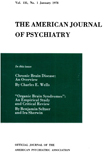A STUDY OF ONE THOUSAND PSYCHOTIC VETERANS TREATED WITH INSULIN AND ELECTRIC SHOCK
Abstract
l. One thousand psychotic veterans were given electric shock therapy, insulin shock therapy, or a combination of the two in sequence following a period of observation during which they had revealed no tendency toward spontaneous improvement.
2. The large percentage of social recoveries obtained in this group testifies amply to the efficacy of the shock therapies in the treatment of functional psychotic reactions incurred in wartime.
3. The therapeutic superiority of insulin shock is revealed in the greater number of social recoveries obtained both when it is used alone and following unsuccessful treatment with electric shock. Insulin is definitely more effective than electric shock in the treatment of paranoid and catatonic schizophrenia. The remissions attained from insulin treatment are more lasting.
4. Psychotic reactions precipitated under the stress of combat which had not improved spontaneously responded somewhat better to shock therapy than those patients whose psychotic reactions were precipitated under noncombat, environmental stress.
5. The well-integrated prepsychotic personality proved to be of favorable prognostic significance.
6. The more favorable rate of recoveries reported in this study may be related to the fact that the veterans constituted a selected group of young men in whom the psychotic reactions were precipitated under great emotional stress.
Access content
To read the fulltext, please use one of the options below to sign in or purchase access.- Personal login
- Institutional Login
- Sign in via OpenAthens
- Register for access
-
Please login/register if you wish to pair your device and check access availability.
Not a subscriber?
PsychiatryOnline subscription options offer access to the DSM-5 library, books, journals, CME, and patient resources. This all-in-one virtual library provides psychiatrists and mental health professionals with key resources for diagnosis, treatment, research, and professional development.
Need more help? PsychiatryOnline Customer Service may be reached by emailing [email protected] or by calling 800-368-5777 (in the U.S.) or 703-907-7322 (outside the U.S.).



